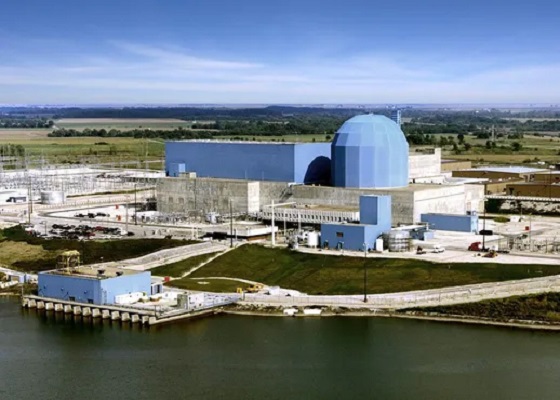Business
Meta inks 20 year deal for nuclear power

 MxM News
MxM News
Quick Hit:
Meta has signed a 20-year agreement to purchase nuclear energy from Constellation Energy’s Clinton Clean Energy Center in Illinois. The deal not only saves a struggling nuclear facility from potential shutdown but also signals Meta’s entry into the nuclear space—a direction long championed by President Donald Trump as part of his ambitious pro-American energy strategy. While big tech often aligns itself with global climate pledges, Meta’s move reveals a rare alignment with a policy rooted in national energy security and self-sufficiency.
Key Details:
-
Meta will purchase 1.1 gigawatts of nuclear energy annually starting in 2027, enough to power a mid-sized city.
-
The Clinton Clean Energy Center’s future was in jeopardy until this deal; Meta’s backing enables continued operation and potential expansion.
-
President Trump has signed executive orders aiming to quadruple U.S. nuclear output by 2050, a vision that aligns with Meta’s pivot to nuclear energy.
Diving Deeper:
In a major shift, Meta has inked a two-decade-long deal to buy all the nuclear energy output from Constellation Energy’s Clinton Clean Energy Center. This move secures approximately 1.1 gigawatts of carbon-free power starting in 2027—effectively salvaging a plant that had been teetering on the brink of early closure due to the expiration of state-backed subsidies.
Without Meta’s commitment, the Clinton facility, which has relied on zero-emission credits since 2017, would likely have shut down. Instead, the plant now faces a renewed lease on life and even a proposed expansion of its output by 30 megawatts. While the energy will feed into the regional grid and not directly power Meta’s servers, the tech firm says this still furthers its broader goal of sourcing 100% clean electricity.
Meta’s head of global energy, Urvi Parekh, acknowledged the broader significance of the decision. “We are proud to help keep the Clinton plant operating for years to come and demonstrate that this plant is an important piece to strengthening American leadership in energy,” she said.
That sentiment aligns closely with the vision President Donald Trump outlined in a recent series of executive orders aimed at resurrecting U.S. nuclear dominance. Trump’s directives target a sweeping overhaul of the Nuclear Regulatory Commission, investment in small modular reactors (SMRs), and domestic sourcing of nuclear fuel—policies designed to reverse decades of regulatory stagnation and reliance on foreign energy.
The Meta-Constellation agreement is part of a broader trend among tech titans leaning into nuclear energy. Google has pledged to fund three new nuclear sites and partnered with SMR developer Kairos Power. Amazon, for its part, has invested more than $500 million into SMR projects and bought a nuclear-powered data center campus in March.
However, Meta’s deal with Constellation is its first concrete nuclear investment, representing not just a bet on energy security but also a nod to the Trump administration’s approach. President Trump has repeatedly emphasized the role nuclear must play if America is to achieve true energy independence and withstand the geopolitical threats posed by nations like China, Russia, and Iran.
Constellation CEO Joe Dominguez noted that “supporting the relicensing and expansion of existing plants is just as impactful as finding new sources of energy.” That philosophy mirrors the Trump energy doctrine—pragmatic, forward-looking, and unapologetically pro-American.
Notably, Constellation is also weighing a proposal to build an SMR at the Clinton site, pending regulatory approval. It’s a bold prospect that could align seamlessly with President Trump’s executive mandates to cut red tape and accelerate innovation in the nuclear space.
Business
Government distorts financial picture with definition of capital

“The government is acting fast and loose with the definition of ‘capital. Handing out corporate welfare shouldn’t be considered ‘capital.’
The Canadian Taxpayers Federation is calling on Prime Minister Mark Carney to focus on reducing debt rather than distorting the financial picture by watering down the definition of “capital” spending, as noted by the Parliamentary Budget Officer.
“The PBO shows the government is inappropriately expanding the definition of ‘capital’ spending,” said Franco Terrazzano, CTF Federal Director. “The reality is taxpayers need to cut through Carney’s budget spin and look at one number: How fast is the debt is going up?”
The Carney government announced it’s separating operating and capital spending in its budget. It also released its criteria for what it would consider capital spending.
The PBO’s analysis found that “Finance Canada’s definition and categories expand the scope of capital investment beyond the current treatment of capital spending in the Public Accounts of Canada.”
The PBO added that “based on our initial assessment, we find that the scope is overly expansive and exceeds international practice such as that adopted by the United Kingdom.”
“The government is acting fast and loose with the definition of ‘capital,’” Terrazzano said. “Handing out corporate welfare shouldn’t be considered ‘capital.’
“Regardless of the spending category, more debt means more interest payments and that’s what taxpayers need to focus on to hold the government accountable.”
The PBO’s Economic and Fiscal Outlook projects this year’s “deficit to increase sharply to $68.5 billion.” Debt interest charges will cost taxpayers $55.3 billion this year. That means that paying interest on the federal debt will cost each Canadian about $1,300 this year.
“The government is trying to muddy the water with its accounting nonsense,” Terrazzano said. “The government should stop focusing on cutting the numbers and instead focus on cutting the debt.
“Taxpayers will need to cut through all the accounting noise from the government and focus on one question: Is the debt going up or down?”
Business
Canada Post is failing Canadians—time to privatize it

From the Fraser Institute
By Jake Fuss and Alex Whalen
In the latest chapter of a seemingly never-ending saga, Canada Post workers are on strike again for the second time in less than a year, after the federal government allowed the Crown corporation to close some rural offices and end door-to-door deliveries. These postal strikes are highly disruptive given Canada Post’s near monopoly on letter mail across the country. It’s well past time to privatize the organization.
From 2018 to the mid-point of 2025, Canada Post has lost more than $5.0 billion, and it ran a shortfall of $407 million in the latest quarter alone. Earlier this year, the federal government loaned Canada Post $1.034 billion—a substantial sum of taxpayer money—to help keep the organization afloat.
As a Crown corporation, Canada Post operates at the behest of the federal government and faces little competition in the postal market. Canadians have nowhere to turn if they’re unhappy with service quality, prices or delivery times, particularly when it comes to “snail mail.”
Consequently, given its near-monopoly over the postal market, Canada Post has few incentives to keep costs down or become profitable because the government (i.e. taxpayers) is there to bail it out. The lack of competition also means Canada Post lacks incentives to innovate and improve service quality for customers, and the near-monopoly prohibits other potential service providers from entering the letter-delivery market including in remote areas. It’s clearly a failing business that’s unresponsive to customer needs, lacks creativity and continuously fails to generate profit.
But there’s good news. Companies such as Amazon, UPS, FedEx and others deliver more than two-thirds of parcels in the country. They compete for individuals and businesses on price, service quality and delivery time. There’s simply no justification for allowing Canada Post to monopolize any segment of the market. The government should privatize Canada Post and end its near-monopoly status on letter mail.
What would happen if Ottawa privatized Canada Post?
Well, peer countries including the Netherlands, Austria and Germany privatized their postal services two decades ago. Prices for consumers (adjusted for inflation) fell by 11 per cent in Austria, 15 per cent in the Netherlands and 17 per cent in Germany.
Denmark has taken it a step further and plans to end letter deliveries altogether. The country has seen a steep 90 per cent drop in letter volumes since 2000 due to the rise of global e-commerce and online shopping. In other words, the Danes are adapting to the times rather than continuing to operate an archaic business model.
In light of the latest attempt by the Canadian Union of Postal Workers to shakedown Canadian taxpayers, it’s become crystal clear that Canada Post should leave the stone age and step into the twenty-first century. A privately owned and operated Canada Post could follow in the footsteps of its European counterparts. But the status quo will only lead to further financial ruin, and Canadians will be stuck with the bill.
-

 COVID-191 day ago
COVID-191 day agoDevastating COVID-19 Vaccine Side Effect Confirmed by New Data: Study
-

 COVID-192 days ago
COVID-192 days agoFreedom Convoy Sentencing: Lich and Barber escape prison terms but will spend months in house arrest
-

 Alberta1 day ago
Alberta1 day ago‘Visionary’ Yellowhead Pipeline poised to launch Alberta into the future
-

 Crime2 days ago
Crime2 days agoCanadian Sovereignty at Stake: Stunning Testimony at Security Hearing in Ottawa from Sam Cooper
-

 COVID-192 days ago
COVID-192 days agoChris Barber will not see prison time for his role in peaceful Freedom Convoy
-

 Crime2 days ago
Crime2 days agoThe Bureau Exclusive: Chinese–Mexican Syndicate Shipping Methods Exposed — Vancouver as a Global Meth Hub
-

 Red Deer11 hours ago
Red Deer11 hours agoThe City of Red Deer’s Financial Troubles: Here Are The Candidates I Am Voting For And Why.
-

 Alberta1 day ago
Alberta1 day agoSheriffs shut down Olds drug house









